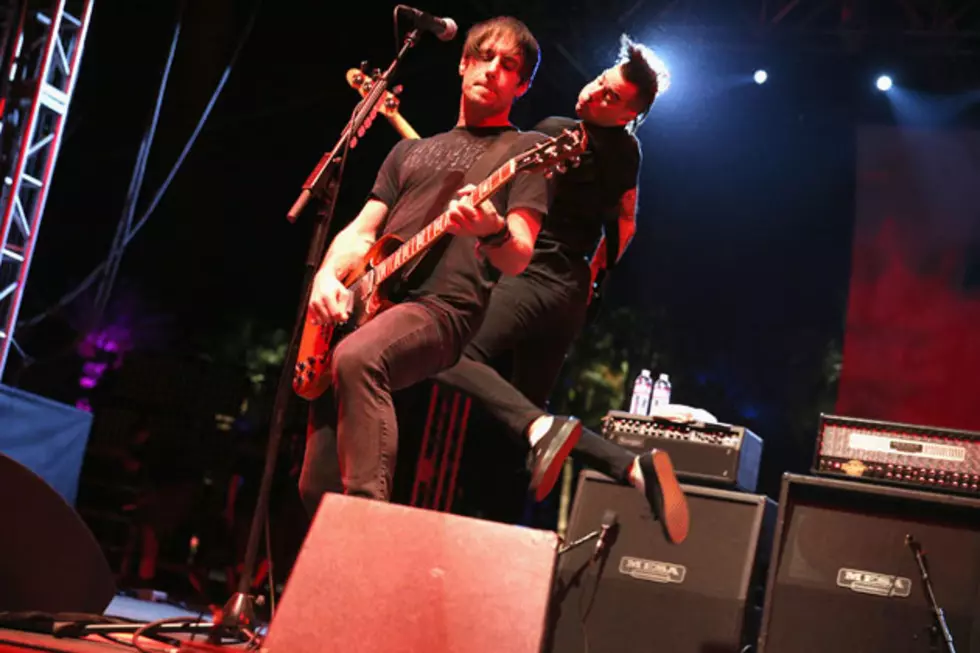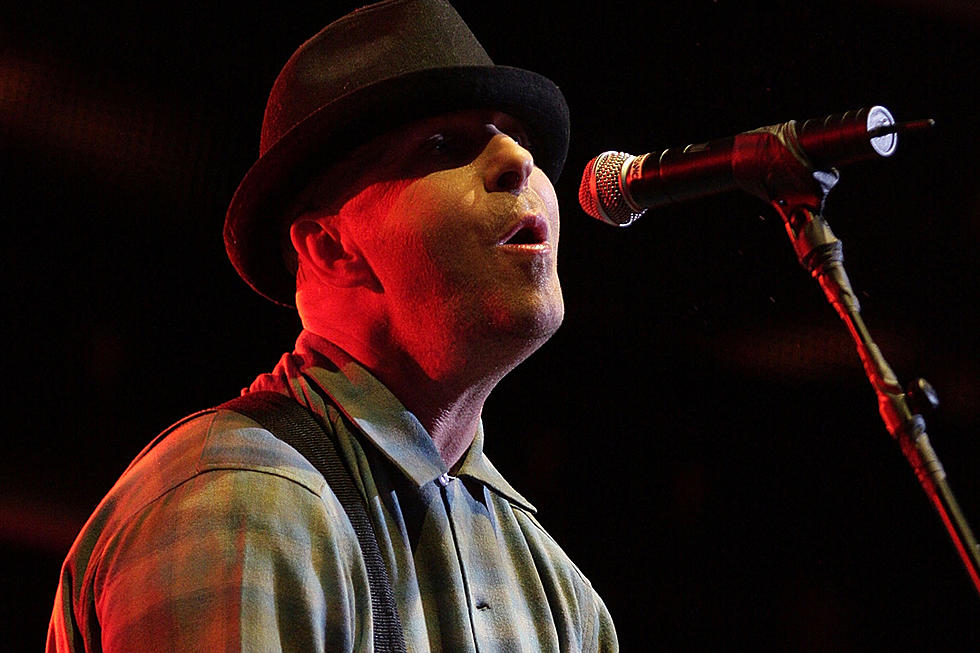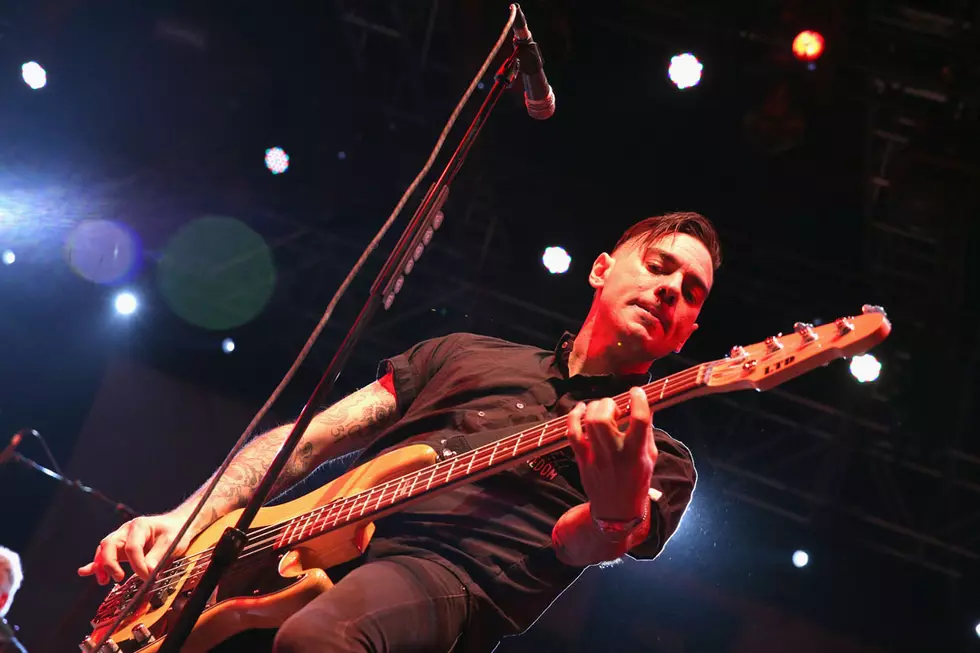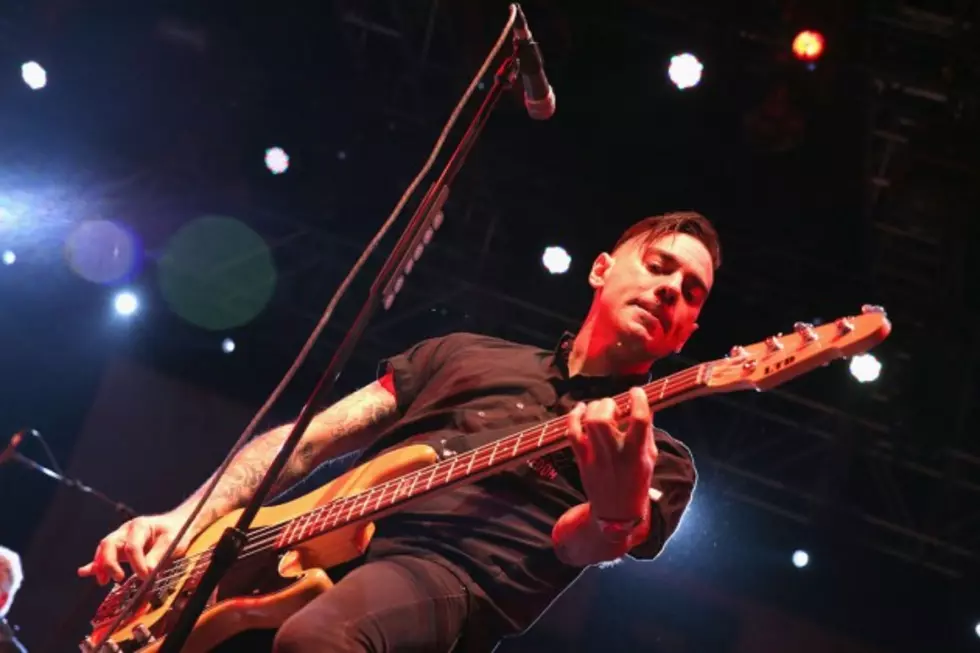
Anti-Flag’s Chris Barker on Divorce, Personal Grief, Police Brutality + ‘American Spring’
Anti-Flag bassist Chris Barker -- a.k.a. Chris #2 -- had a lot on his mind when he and frontman Justin Sane set out to write the band's new album, American Spring (out May 26 on Spinefarm Records).
In an essay he contributed for the new album's liner notes, Barker writes, "American Spring [a play on the wave of Middle East revolutions collectively referred to as the "Arab Spring'] is now." We recently caught up with Barker for a lengthy conversation -- check out our exclusive chat below:
After 22 years as a band -- 16 for you -- how challenging is it to come up with riffs?
Musically speaking, I didn't have a challenge writing as much as I did emotionally. [Laughs] I was in a pretty dark and different headspace for writing this record than I was for any other Anti-Flag record. I had a relationship end that was 17 years of my life -- the entire time that I've been in this band. I had a new self-identity, and I was struggling with the fact that it was probably being in a band that led to the demise of my relationship, and that writing records and going on tour led to the turmoil that I was in. And then I was being asked to do all that again. So that led to a conversation within myself and with the rest of the guys about just what you said: It's 22 years, this is our 10th record. Why do it? [Laughs] I mean, we can go and play songs from Die for the Government or The Terror State or For Blood and Empire and tour Europe for a couple months of the year and live okay lives here in Pittsburgh. The cost of living here is relatively low, and we wouldn't have to work nearly as hard if we weren't trying to share new music and new ideas with people.
So the conversation ended with us saying that this record has to be a tentpole record for Anti-Flag. It has to be one that people reference as being important to the life of our band. And it has to be one that, when people look back on records that came out in 2015 -- in an era of unrelenting police violence, more drone strikes in the Middle East than ever and wealth inequality greater than it's ever been -- when they look at the record that we made, they'll say that we were commenting on all of that and that we were on the right side of history.
After ending your marriage, how much did the other guys have to offer as far as how they balance family, relationship, personal and even home life with being in a band?
We've all faltered individually several times. What we've found is that the collective is there to pick up the weight and make sure that we stay on path and that we don't falter as a band. But we allow whoever is going through the transition to go through it at their own pace. There was a lot of advice. Pat [Thetic] had a similar thing happen to him already once, and I leaned on him a lot. I mean, I lean on him a lot just as a person because he's the most compassionate Anti-Flag member of all. [Laughs] When I f--- s--- up in my life really bad, I'm always going to him for advice.
But this was certainly a moment when I was leaning on him more than others. I don't know any other way to be or any other way to operate my life than to say that I'm in this band with these three other people and we worry about each other. Even though sometimes we come home and scatter. Because we're on the road for 200 days a year, and when we're at home we don't want to see each other. But that doesn't mean that whenever one of us goes through something important or has trying times, that we're not there for each other.
It sounds like you spent more time with those guys than you did in your life partnership of 17 years.
Well, yeah, that's true -- at least 50-50, if not more. And that makes you wonder, "Can I fully be fulfilled in a relationship? Am I present enough?" I had assumed that I was doing all the right things, I had assumed that my life plan was one way, and then all of a sudden it was new. But, you know, writing these songs and using that remembrance of loss and grief to have real empathy for some the issues that we're tackling on the record, I now feel as if I'm coming out on the other side of that. I'm getting more comfortable with who I am, as a person who's in a punk rock band that plays a lot of shows and travels the world.
And you're also threading the topical concerns and social issues through a more personal basis. American Spring has a macro, bigger-picture perspective, and then there's an individual perspective, which is more ground-level. The balance between those two things gives the subject matter a frame.
The ideals of punk rock are empathy and compassion -- not necessarily a sound or any of the things that you can point at and say, "That's punk." So when you're going through something on a real level, and when you're feeling more emotional and more in-tune with the emotions surrounding things that are happening, you then look at situations with more empathy. And that, to me, is where the connection to issues like the killings of Mike Brown, Trayvon Martin, Eric Garner and Walter Scott comes from. Because I'm more emotional, I'm then referencing my own life -- the death of my sister through violent crime, the subsequent trial of her killer, which I believe was an American injustice -- and I'm able to comment on those issues with more empathy than maybe I was able to in the past when I was less open to my emotions and less open to putting myself in a situation and trying to speak to it on a real and personal level, not just as an observer.
This is twice now that you've had to pick up and somehow get yourself back into a mode of playing after two major life disruptions. How have you been able to muster up the will to get back into band mode?
Well, I'm not 100 percent there yet. I feel if I just keep moving and fill my day with enough s---, it won't catch up to me. But even still, it catches up to me. A car will drive by that my sister commented on, or something will remind me of my relationship and my ex-wife, and I'll feel as if I'm not quite sure who I am.
For example, I remember a specific time which was probably the most triumphant moment for Anti-Flag. We were headlining this festival in Poland and there were 350,000 people there. They weren't all there for us, but they were enjoying themselves to a new level for us. It was a truly unique experience in the band's life. We were the only music happening at that moment, and there was a sea of humans as far as they eye could see. We do this thing at shows, especially at big festivals, where I'll try to get the people there to turn to one another and shake each other's hands and just say, "Hello, and if I pass you tomorrow at the festival grounds or in the street, I'm going to say 'What's up.'"
The band is only there for 45 minutes or an hour or an hour and a half depending on how long we're playing. But these folks live there, and they should know one another and have some sense of community that lasts longer than just the rock and roll, punk rock show. So anyway, I'm doing this, and in the back of my mind I'm thinking about a particularly difficult moment as my relationship was ending while I was on this tour. I was upset at that while this really beautiful moment was happening in front of me. It was a real juxtaposition of emotions. I got lost in that moment, and I wasn't sure if I wanted to even finish the song. But then you recognize that there is value in what you're doing. And if we put positivity back into the world, there's no guarantee that it'll come back to us, but I am a firm believer that it'll come back to someone. That's the way I've been trying to operate in the face of all these things.
Speaking of the live show, after you've put together a new record, how do you go about selecting which songs you're going to include in the live set -- especially in light of your recent string of limited-edition 7" singles?
We're going to try to play every song from the new record, which is not in-step with the way we've operated over the last four records [Laughs], where it was like, "Let's take these three songs and rotate 'em in and out," and we'd rely heavily on the back catalog. But we want to be good at playing these new songs and be able to present them in a way that they feel as important as any other "staple." We're also doing some secret shows where we just show up and play the record. Where we have a luxury is that we've done some recent things for our 20th anniversary where we've gone back and played specific records or done shows drawing from the first four or the last four records. I also think that people are hungry for commentary on what's happening now. We did a run of shows where we did all of The Terror State. Those songs were written in the lead-up to the 2003 invasion of Iraq, and it's sad and frustrating how many of those songs are apropos for what's happening today. But they're not offering commentary through a 2015 lens. People might not want to hear mostly new songs, but our goal is to be able to play them in such a way that in the end, they'll feel like it was worth being a part of that show or moment.
You weren't in the band yet, but the first Gulf War in '91 was pivotal in the formation of Anti-Flag and the band's anti-nationalist stance. What was that period like for you? How out-of-step were you with all the patriotism that was in the air? I mean, it was almost as if it was being advertised during the Super Bowl.
Yeah, and you had the Desert Storm trading cards and all of that. It was definitely a marketed war. And that's what I remember. I was young -- 11, 12 years old -- so I wasn't in a place to be politicized about it ... however, that was the beginning of my politicization. My brother was often having run-ins with the law. He was pretty good at evading them and not getting caught. In one case, there was a drug deal where he was caught, but there was a loophole so he got off. I ran into a police officer somewhere afterward and he said, "Oh, you're Mike's brother -- we're gonna get 'im." I remember thinking, "That's f---ed up." From there, you turn to the patriotism around the Iraq war, and now -- with perspective and zooming out a bit -- I can look back on that whole period and say that there was a lot I was becoming aware of that tied together and shaped the way I feel about things.
How did that lead to you being able to relate to Justin by the time you were recruited?
From there, it was a normal trajectory -- I got a Green Day tape. [Laughs] From there, you do searching, and you find the Dead Kennedys, and then you find out that there's this band in Pittsburgh named Anti-Flag that's a political punk rock band. And that's all that I was looking for. They had a song named "F--- Police Brutality" in 1996, on Die for the Government, and that really resonated with me. To know that police brutality at that time was highest in Pittsburgh than anywhere else in the country, it seemed really relevant and important that they'd write that song. Justin and I have really similar personalities when it comes to our views on things.
Based on my upbringing, I'm definitely more emotional with my decision-making and the way that I create things and operate on a day-to-day pace. I tend to go with my gut and have feelings on things. Whereas, based on Justin's upbringing -- with him being the youngest of nine, and his indoctrination into punk rock and into politics -- he's far more book-read and analytical. I think that's why, when we write songs together, they tend to have what you were describing, where they're focused inward and outward at the same time.
The American Spring liner notes include scathing commentary on President Obama courtesy of an editorial by activist-academic Cornel West. Who in the band reads Cornel West?
Justin's a reader and I'm a listener. The politics of the band often go cyclical, where someone will find something. Like I'll be listening to Democracy Now! -- which often features West. I think that's how we discovered him -- and then Justin will go out and read books on the same topics. But I'm a big fan of his interviews and activism.
How tricky is it to be in a band and balance the ideals of four people, especially over two decades?
Sometimes it's way more of a challenge than it should be. [Laughs] There are some decisions that we argue over, and they're tremendously inconsequential to the band. But we've existed this long because we have this sense of the most passionate member wins, and he gets backed up. It's a really interesting way to do things, but I definitely know that if somebody comes to the table and says, "I don't fully agree with this idea," and explains it in a way that shows why he cares about it, the other members will get onboard. We've had a lot of success with that -- when it comes to songwriting too. It definitely benefits the band when we can get everybody onboard. A good example is the new song "Brandenburg Gate," which started purely in my personal world. But I knew that, unless we found a way for everyone to connect with it, it would never get played. Maybe they would do me the service of allowing it on the record, but for setlists, the songs that we don't all agree with tend to get left off.
Can you point to a specific "inconsequential" situation that you argued over?
Yeah. It's hard to tell you without sounding insane [Laughs], but there was a band that was trying to buy onto a tour we were doing, which we would never entertain in any way, shape or form. But it was solicited to us. There was, at best, a four and a half minute-long conversation about it. But the people in the band who were very opposed to it, were so overreacting to those who were just like, "Should we even have a discussion about this?," that it became this really tense moment in the band's life. [Laughs] And it was just two sides: "Hell f---ing no!" vs. "Does this even merit a discussion? Because we're probably gonna say no."
And it was like [mocking outrage], "You're a sympathizer for people to bribe their way onto shows!" The line was drawn in the sand, "Which side are you on?!" [Laughs] Subsequently, this band did not buy their way onto the tour. We all knew that would be the end result, too, so I couldn't believe we even had the conversation to begin with.
So if that decision became so contentious, I take it car commercials and iPhone sponsorships haven't been on the table much.
Right -- but there have been concessions. For example, Pat really doesn't like video games. He believes they train kids for war. It doesn't matter what video game it is. But I'm a huge fan of ice hockey, and we got asked to contribute a song for an ice hockey video game. [Laughs] So I was like, "Pat, you're not gonna take this childhood dream away from me. It doesn't matter if you think it trains people for war, we're going to have a song in this video game." He understood that it was very important to me, and he conceded. But there are moments like that, where we'll have to have a discussion.
That's funny, because in Anti-Flag every individual has ultimate veto power over everyone else, but in that case you vetoed his veto!
[Laughs] Exactly!
Anti-Flag's ninth LP, American Spring, is set for release on May 26. You can pre-order your copy here, and make sure to check out the band's full tour itinerary at this location.
Watch Anti-Flag's Lyric Video for "Fabled World"
More From Diffuser.fm

